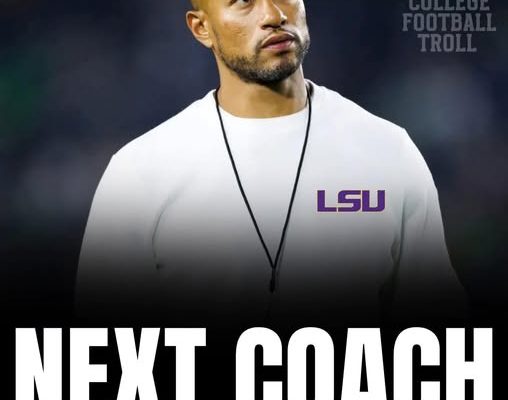Louisiana’s LSU Tigers football program is on the brink of a transformative shift, one that could redefine the relationship between coaches, administrators, and the state itself. Following the high-profile departure of Brian Kelly, Governor Jeff Landry has publicly suggested that LSU’s next head coach will operate under a “patently different” contract, signaling sweeping changes not only to compensation structures but to the very leadership framework of the football program. This development is not just about finding a replacement for Kelly; it is about a systemic reevaluation of how the program is managed, how accountability is enforced, and how public resources intersect with elite collegiate athletics.
Kelly’s exit capped a turbulent season for the Tigers, whose performance fell far short of the high expectations that accompany a storied SEC football program. His contract, a staggering 10-year, $95 million deal, leaves LSU facing a potential $54 million buyout, a sum that has drawn public scrutiny and criticism. The financial magnitude of this situation has prompted direct intervention from the governor, who has indicated that LSU’s next contract will emphasize accountability, tying compensation more closely to performance outcomes rather than guarantees. Governor Landry’s insistence reflects a broader concern about fiscal responsibility and transparency in the administration of state-funded athletic programs.
The proposed changes extend beyond financial terms. Historically, LSU’s athletic director, Scott Woodward, has held significant authority over hiring and contracts, a structure that facilitated previous high-profile agreements but also exposed the university to substantial financial risk. Governor Landry has indicated a shift in oversight, asserting that the next coaching hire will be directly overseen by the LSU Board of Supervisors rather than solely by the athletic director. This change marks a significant realignment in governance, bringing the state’s elected representatives into a more direct role in major athletic decisions. By doing so, the governor aims to prevent excessive financial commitments and ensure that the program aligns more closely with public interests and expectations.
The implications for contract structure are profound. Future agreements are expected to reduce guaranteed compensation, introduce performance-based incentives, and clarify expectations for postseason achievements, academic outcomes, and program culture. This represents a move away from the traditional model of long-term, high-dollar contracts that place enormous financial burdens on the university regardless of on-field success. It also signals to potential candidates that LSU is prioritizing accountability and measurable results over headline-grabbing salary figures, creating a new paradigm in SEC coaching contracts.
These changes also reshape the program’s leadership dynamics. The next head coach will likely operate within a framework that increases oversight, reporting directly to the governing board while engaging more closely with state stakeholders, boosters, and the public. This structural shift may redefine the relationship between the coach and the administration, emphasizing transparency and collaborative decision-making rather than unilateral authority. For candidates, this means a higher degree of scrutiny and a more performance-driven environment, with clear consequences tied to results.
From a recruitment perspective, the altered contract and governance model may influence LSU’s appeal to top-tier coaching talent. While the program remains competitive and well-resourced, the emphasis on accountability and reduced guarantees could deter candidates accustomed to more autonomous, high-security arrangements. Conversely, it may attract those confident in their ability to deliver immediate success and who value a structured, outcome-focused leadership environment. LSU’s challenge will be to balance these considerations, ensuring that the new model is attractive enough to secure elite coaching talent while maintaining the fiscal and administrative safeguards advocated by the governor.
The ramifications of this governance shift extend beyond financial and contractual considerations. They reflect a broader trend in collegiate athletics, where public oversight is increasingly intersecting with the high stakes of major sports programs. As universities invest in large-scale facilities, lucrative media contracts, and competitive recruiting budgets, public officials are scrutinizing how these resources are deployed and ensuring that high-cost initiatives deliver commensurate outcomes. LSU’s restructuring could serve as a model for other programs facing similar scrutiny, demonstrating how performance-based contracts and enhanced oversight can align athletic ambitions with public accountability.
As LSU navigates the hiring process under this new framework, several critical questions emerge. Who will be willing to accept a contract with less guaranteed security? How will the increased oversight affect day-to-day program management? Will the performance metrics be achievable, and will they foster the culture of excellence LSU desires? The answers to these questions will shape not only the next coaching era but also the long-term trajectory of the program, influencing recruiting, team performance, and public perception.
Immediate steps for LSU will involve a national search for candidates under interim leadership, the development of a revised contract structure, and coordination with the governing board to establish oversight protocols. Engagement with boosters and the broader fan base will also be essential, as stakeholder support remains a critical component of successful program operations. Transparency and clear communication will be key to ensuring that the public, alumni, and fans understand the rationale behind these changes and the benefits they are intended to deliver.
This transition represents more than a simple replacement of one coach with another. It signifies a shift in institutional philosophy, emphasizing sustainable success, accountability, and alignment with both university objectives and public expectations. The governor’s intervention underscores the growing recognition that major college athletic programs, particularly those heavily funded by state resources, must operate with a balance of competitive ambition and fiscal prudence.
The next LSU head coach will inherit a program in flux, with both heightened expectations and a new accountability framework. Success will depend on the ability to navigate the revised governance structure, meet performance-based contractual obligations, and sustain the high level of competitiveness expected by fans and stakeholders. How effectively the university implements this new model will influence not only its own fortunes but potentially set a precedent for other public institutions managing high-profile athletic programs.
Ultimately, LSU’s forthcoming coaching era will be defined by the intersection of performance, governance, and public accountability. The “patently different” contract envisioned by Governor Landry reflects a commitment to aligning coach compensation with tangible results, reducing financial exposure, and increasing institutional oversight. It challenges traditional norms in collegiate athletics, proposing a model that prioritizes both excellence on the field and responsible management of public resources. How well LSU adapts to these changes will shape its competitive landscape, its financial sustainability, and its reputation within the SEC and the broader college football community. The coming months will reveal not only who takes the helm of the Tigers but also whether this new approach can deliver both success and stability in one of college football’s most storied programs.



